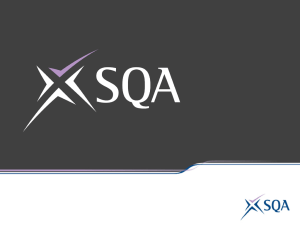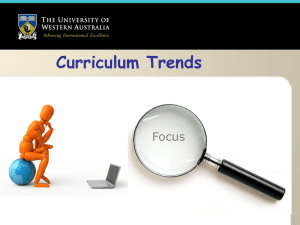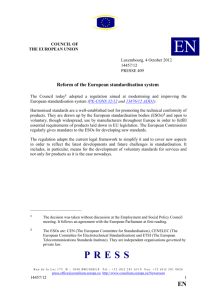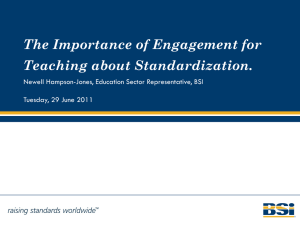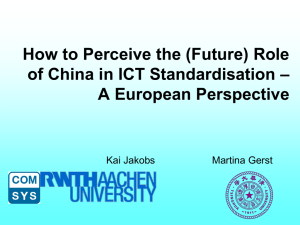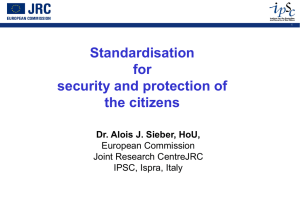report - University of Pretoria
advertisement
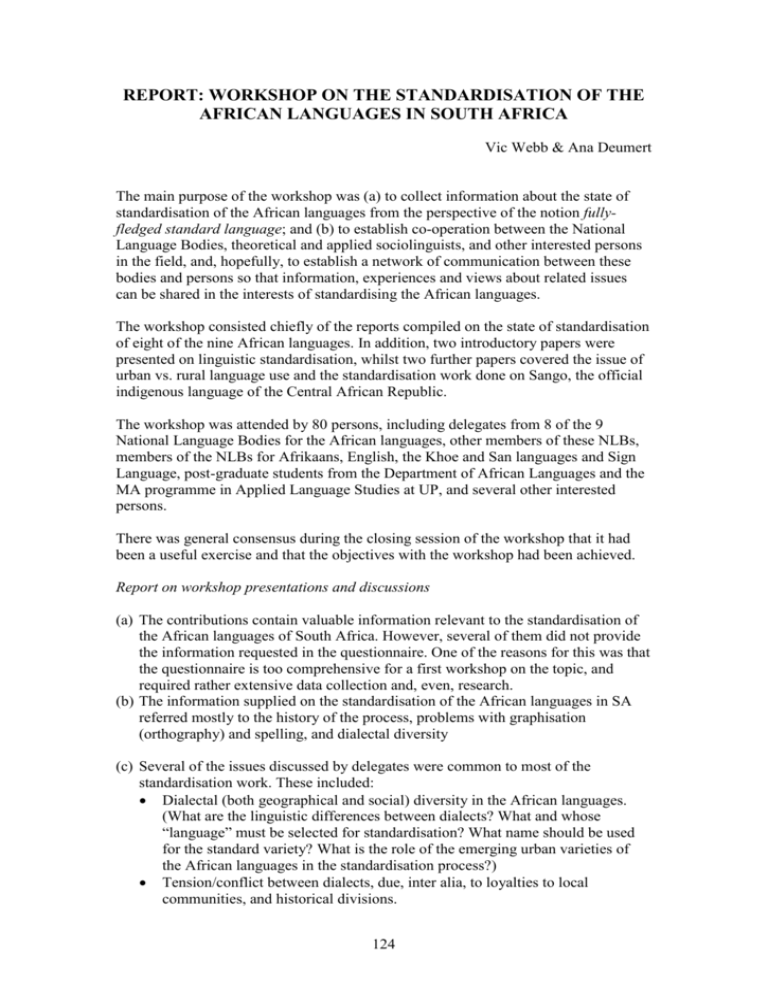
REPORT: WORKSHOP ON THE STANDARDISATION OF THE AFRICAN LANGUAGES IN SOUTH AFRICA Vic Webb & Ana Deumert The main purpose of the workshop was (a) to collect information about the state of standardisation of the African languages from the perspective of the notion fullyfledged standard language; and (b) to establish co-operation between the National Language Bodies, theoretical and applied sociolinguists, and other interested persons in the field, and, hopefully, to establish a network of communication between these bodies and persons so that information, experiences and views about related issues can be shared in the interests of standardising the African languages. The workshop consisted chiefly of the reports compiled on the state of standardisation of eight of the nine African languages. In addition, two introductory papers were presented on linguistic standardisation, whilst two further papers covered the issue of urban vs. rural language use and the standardisation work done on Sango, the official indigenous language of the Central African Republic. The workshop was attended by 80 persons, including delegates from 8 of the 9 National Language Bodies for the African languages, other members of these NLBs, members of the NLBs for Afrikaans, English, the Khoe and San languages and Sign Language, post-graduate students from the Department of African Languages and the MA programme in Applied Language Studies at UP, and several other interested persons. There was general consensus during the closing session of the workshop that it had been a useful exercise and that the objectives with the workshop had been achieved. Report on workshop presentations and discussions (a) The contributions contain valuable information relevant to the standardisation of the African languages of South Africa. However, several of them did not provide the information requested in the questionnaire. One of the reasons for this was that the questionnaire is too comprehensive for a first workshop on the topic, and required rather extensive data collection and, even, research. (b) The information supplied on the standardisation of the African languages in SA referred mostly to the history of the process, problems with graphisation (orthography) and spelling, and dialectal diversity (c) Several of the issues discussed by delegates were common to most of the standardisation work. These included: Dialectal (both geographical and social) diversity in the African languages. (What are the linguistic differences between dialects? What and whose “language” must be selected for standardisation? What name should be used for the standard variety? What is the role of the emerging urban varieties of the African languages in the standardisation process?) Tension/conflict between dialects, due, inter alia, to loyalties to local communities, and historical divisions. 124 The need for an “inclusive” approach to standardisation, i.e. the selection and determination of norms that will not alienate constituting communities (called in the literature a “polycentric approach”: selecting linguistic features from more than one constituting dialect). In addition, the possibility of standard languages as exhibiting flexible stability was noted, i.e. the notion that standard languages can allow for some degree of variation/linguistic pluralism. This in turn would support an “inclusive” approach. The need for a consultative and participatory approach, that is, a “bottom/up” approach that involves speakers in the decision-making process. Problems with orthography and spelling. Co-operation across national borders (Botswana, Lesotho, Mozambique, Namibia, Swaziland and Zimbabwe). The history of standardisation in southern Africa: the role of missionaries, colonial administrators and politicians, and the problems caused by this legacy. (d) Usefulness and appropriateness of the Standardisation Framework (the sociolinguistic questionnaire) used for the workshop As mentioned above, the sociolinguistic questionnaire was too comprehensive for a first workshop. More time is needed to collect and research the information. The information required could be provided during a second, follow-up, workshop. The possibility was mentioned that linguists in departments of African Languages could possibly encourage post-graduate students to undertake research for their honours, masters and doctoral work on specific issues raised in the framework. (e) The importance of linguistic standardisation The importance of linguistic standardisation was raised several times, and it was pointed out that linguistic standardisation was ultimately directed at contributing to the social, economic and cultural development of communities, addressing inequalities, the effective functioning of public life in educational development, economic participation and performance, promoting democratisation, realising human rights, and contributing to community and national integration. (f) Establishing and maintaining meaningful communication between role-players in the standardisation processes (The need to establish co-operation between language practitioners and specialists/sociolinguists.) It was agreed that the following strategies could be considered: The development of a publication based on the workshop papers. This could be handled in the following way: - The workshop presentations will be collected in a volume of workshop proceedings and distributed to each workshop participant. - The workshop proceedings will be distributed at the latest at the end of August 2005. - Critical comment on the workshop proceedings will be requested. 125 - An overview of such critical comment will be circulated to participants, with the aim of allowing presenters to revise and upgrade, where necessary, their presentations.1 - The final version of the workshop proceedings will be published. (It is hoped that PanSALB will agree to publish these proceedings as an Occasional Paper.) - Vic Webb, Ana Deumert and Biki Lepota will act as general editors of the workshop proceedings. - Contributors need to be given the full assurance that the ownership of the different contributions will be formally acknowledged and would remain the intellectual property of the presenters. Follow-up workshops can be considered. Training programmes for members of the NLBs can be considered. Research work in the field of linguistic standardisation by post-graduate students can be considered. (g) Several challenges need attention, for example: Terms to be used: standard vs. non-standard, which represent a problem Implementing a polycentric approach: - What strategies can be used? - How should one go about selecting pluralist norms? - What is the role of English? - What is the role of the urban vernaculars? Addressing negative attitudes to the African languages: How should this be handled? How can the community support necessary to drive standardisation be developed? Establishing support for the standardisation process among the intellectual leaders of speech communities: teachers, church leaders, community leaders, which is an essential component in any standardisation process. Undertaking research on the teaching of African languages as L1s, L2s and L3s: How well do speakers of these languages read and write them? Are teachers trained to teach African languages in these formats? Are the curricula for these subjects appropriate and relevant? Are there suitable text-books (grammars, dictionaries, reading material, etc.)? Do teachers use the applicable didactic methods? Developing expertise among members of the technical committees for standardisation in the NLBs - Should training programmes be made available? - Should Departments of African Languages be encouraged to include sociolinguistic courses on linguistic standardisation in their training programmes? How can funding be obtained: - For research? - For further workshops? - For training purposes? 1 This decision, and the preceding three, could not be implemented because of time and work constraints. 126 Expression of thanks to: PanSALB, for logistic support and funding; in particular to the CEO, Cynthia Marivate, Marietta Alberts and Vusi Skosana; The NLBs, and especially the presenters (see programme); Ana Deumert, Michel Lafon and Marcel Diki-Kidiri, and the institutions that provided the funds to bring them to the workshop, viz.: the Faculty of Arts, Monash, Australia; IFAS, Llacon and CNRS2; BE@UP, for pens, folders and name tags; The University of Pretoria, for providing the venue free of charge; The Dept of African Languages, UP; the Unit for Academic Literacy, UP and the Dept. of Afrikaans, UP for covering the costs of faxes, duplicating costs and the venues for the many meetings of the organising committee; and The members of the organising committee: Biki Lepota, Phillip Pare, Bhuti Skosana, Elsabé Taljard, Rachèlle Gauton, Refilwe Ramagoshi and Vic Webb (chair). 2 IFAS: French Institute of South Africa; Llacon: Laboratoire des Langues et Culture d'Afrique Noire/Langage, Langue et Cultures d’Afrique noire; CNRS: Centre National de la Recherche Scientifique 127
